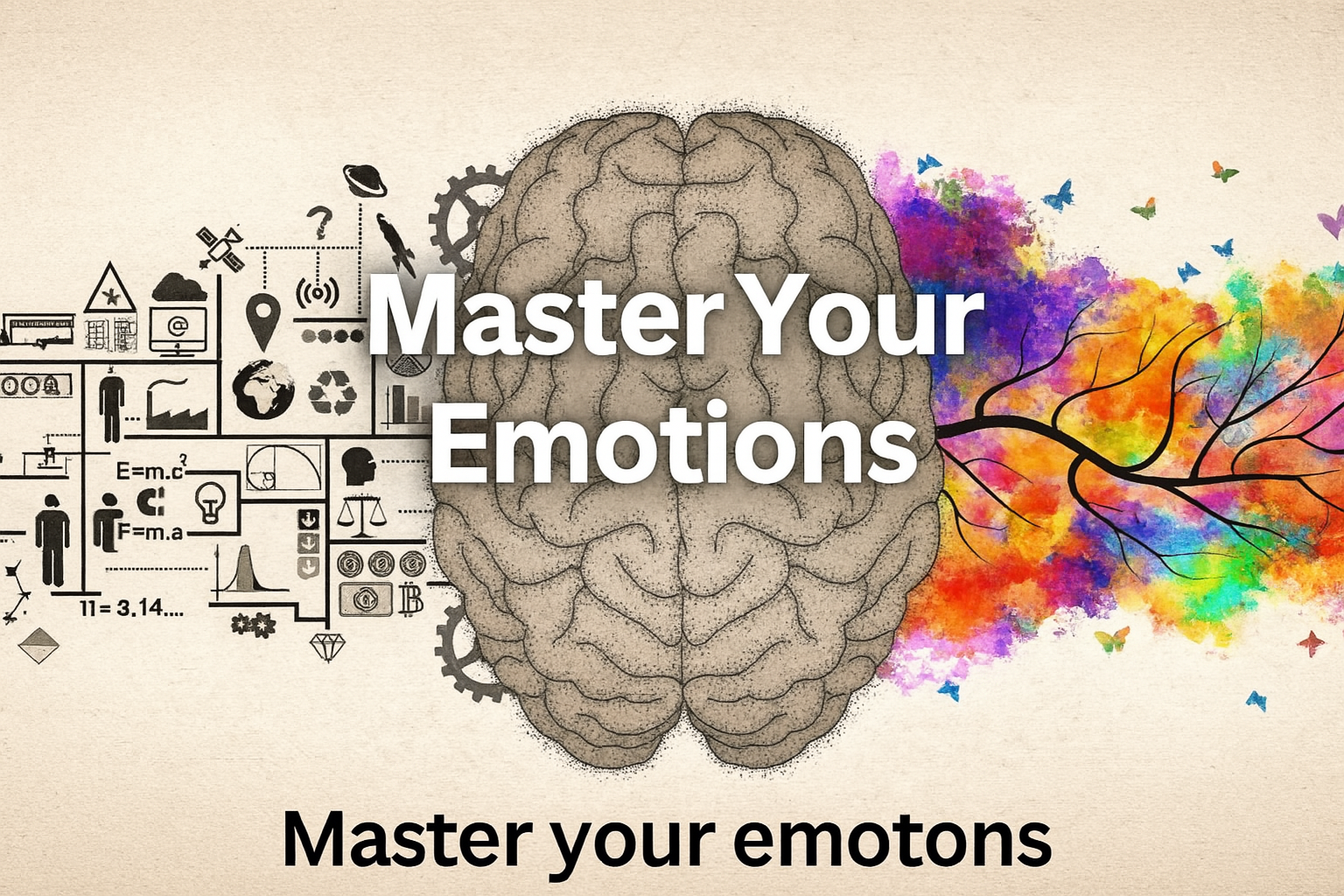Updated 29/06/25: This article was refreshed with new insights, refined visuals, and deeper guidance on how to master your emotions and lead from within.
Ever feel like your emotions are running the show, while you’re just along for the ride? To master your emotions is the skill that puts you back in the driver’s seat. It sharpens your self-awareness, strengthens relationships, and turns decision-making into an art form… rather than a chaotic game of chance.
If you’ve landed here, chances are:
- You feel overwhelmed by intense emotional reactions.
- You regret things you said or did in emotional moments.
- You’re tired of feeling hijacked by moods you don’t understand.
- You want to stop overthinking and start responding from calm clarity.
You’re not alone. And the good news is: you can learn to master your emotions.
How to Master Your Emotions: A Self-Check
Let’s start with a little reflection:
Can you pinpoint exactly what you’re feeling in the moment, or is it just a blur of vibes?
Do you stay grounded when emotions run high, or does it all spiral?
Can you sense what others are feeling, even when they mask it?
If you answered “yes” to any of these, you already hold the seed of emotional mastery. If not, don’t worry… it’s not a personality trait. It’s a skill. And it can be cultivated.
“To know oneself is the beginning of all wisdom“… and shadow work will get you there. If you’re new to shadow work, check out my article 7 Powerful Ways to Do Shadow Work and Transform Your Life.
Why You Must Master Your Emotions

Let’s be real… unprocessed emotions cost us. They cost us peace, relationships, opportunities, and sometimes even our health. When you master your emotions, you take your power back. You stop living in reactivity. You stop repeating emotional loops. You begin to respond, not react.
What Does It Mean to Master Your Emotions?
At its core, emotional mastery is the ability to observe, regulate, and understand your emotions, without suppressing or becoming consumed by them.
Think of it like having a high-end emotional navigation system. Instead of feeling lost in your inner world, you become a skilled guide.
It’s the difference between being tossed in the storm… and knowing how to steer your ship.
The First Step to Mastering Your Emotions: Self-Awareness

Self-awareness is the foundation of emotional mastery. It’s about knowing what you feel, why you feel it, and where it lives in your body.
Without it, you’re reacting to invisible patterns. With it, you gain clarity, confidence, and the power to choose your responses.
A self-aware person doesn’t bypass their feelings. They witness them with compassion and curiosity.
Why You Haven’t Mastered Your Emotions Yet

You may have been taught to:
- Suppress emotions (“Don’t be so sensitive.”)
- Avoid conflict at all costs
- Distrust your intuition
- Distract yourself instead of feeling deeply
But emotions aren’t the enemy. They’re messengers. And when you learn to listen, they’ll stop shouting.
What Happens When You Master Your Emotions
- You stop taking things personally.
- You navigate conflict with more grace and less guilt.
- You regulate your nervous system and protect your energy.
- You become magnetic to emotionally safe people.
- Most importantly, you move through life feeling calm, clear, and in command—not ruled by the chaos within or around you.
How to Master Your Emotions: 5 Pillars
- Self-Awareness – Know your triggers, patterns, and emotional history.
- Self-Regulation – Learn to pause, breathe, and soothe yourself.
- Motivation – Cultivate internal drive, not just external rewards.
- Empathy – Understand others emotionally without losing yourself.
Social Skills – Build emotionally intelligent communication and connection.
Mastering Emotions in Relationships

Ever walked away from a conversation wishing you could rewind what you said? Or felt hijacked by someone else’s energy?
That’s why emotional mastery is the real relationship game-changer.
When you master your emotions:
- You stop reacting defensively.
- You become a powerful listener.
- You create space for deeper, safer connection.
You learn to read between the lines, and respond with intention instead of impulse.
Final Thoughts: Master Your Emotions, Master Your Life
Final Thoughts: Master Your Emotions, Master Your Life
Mastering your emotions isn’t about control. It’s about relationship. With your triggers. Your patterns. Your inner child. Your shadow. Your future self.
It’s about choosing how you want to feel and having the tools to return there, again and again.
So if you’re ready to stop spiralling… and start leading… this is your call.
Master your emotions… and you’ll master your life.
- The Inner World: Your Untapped Universe of Self-Discovery
- 7 Powerful Ways to Do Shadow Work and Transform Your Life
- The No-Nonsense Power of the Dark Feminine: Reclaiming Your Energy and Cutting the Chaos
Further Reading on How to Master Your Emotions
1. What Makes a Leader – Harvard Business Review
Discover how emotional intelligence shapes leadership, influence, and personal growth.
🔗 Read the article
2. Emotional Intelligence – Greater Good Science Center
A beginner-friendly guide to understanding and developing emotional intelligence.
🔗 Explore the resource
 About the Author
About the Author
Claire is a writer, intuitive healer, and mystic weaving the feminine through story, ritual, and lived experience. Through her blog she shares sacred insights on spiritual growth, personal power, and the soul’s deep remembering. Her work is rooted in Earth wisdom, emotional depth, and the kind of tenderness that transforms. She believes magic is not something we find, but something we uncover within ourselves.







5 Reflections
Share your reflection below... I’d love to hear how this transmission lands for you.
This reflection space is part of a living temple of dialogue, a place for insight, resonance, and respectful exchange. All comments are read with care and may be lovingly edited for clarity, formatting, or safety before publication. Please share from your heart, speak with kindness, and keep this space high in frequency. Promotional links, aggressive language, or off-topic content will be removed. Thank you for honoring the spirit of this sanctuary.